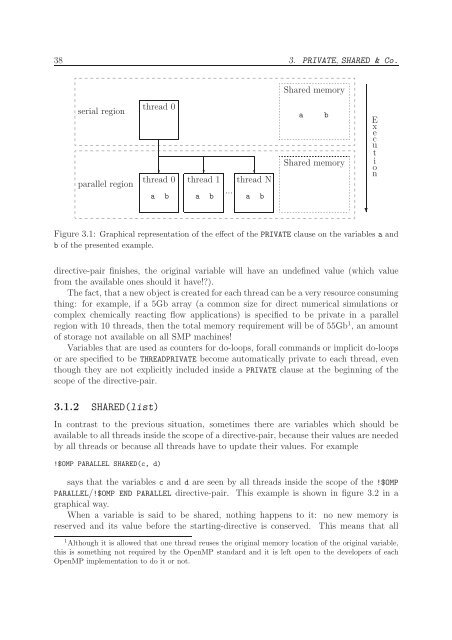Parallel Programming in Fortran 95 using OpenMP - People
Parallel Programming in Fortran 95 using OpenMP - People
Parallel Programming in Fortran 95 using OpenMP - People
You also want an ePaper? Increase the reach of your titles
YUMPU automatically turns print PDFs into web optimized ePapers that Google loves.
38 3. PRIVATE, SHARED & Co.<br />
Shared memory<br />
serial region<br />
thread 0<br />
a<br />
b<br />
E xecution<br />
parallel region<br />
❄ ❄ ❄<br />
thread 0 thread 1 thread N<br />
...<br />
a b a b a b<br />
Shared memory<br />
❄<br />
Figure 3.1: Graphical representation of the effect of the PRIVATE clause on the variables a and<br />
b of the presented example.<br />
directive-pair f<strong>in</strong>ishes, the orig<strong>in</strong>al variable will have an undef<strong>in</strong>ed value (which value<br />
from the available ones should it have!?).<br />
The fact, that a new object is created for each thread can be a very resource consum<strong>in</strong>g<br />
th<strong>in</strong>g: for example, if a 5Gb array (a common size for direct numerical simulations or<br />
complex chemically react<strong>in</strong>g flow applications) is specified to be private <strong>in</strong> a parallel<br />
region with 10 threads, then the total memory requirement will be of 55Gb 1 ,anamount<br />
of storage not available on all SMP mach<strong>in</strong>es!<br />
Variables that are used as counters for do-loops, forall commands or implicit do-loops<br />
or are specified to be THREADPRIVATE become automatically private to each thread, even<br />
though they are not explicitly <strong>in</strong>cluded <strong>in</strong>side a PRIVATE clause at the beg<strong>in</strong>n<strong>in</strong>g of the<br />
scope of the directive-pair.<br />
3.1.2 SHARED(list)<br />
In contrast to the previous situation, sometimes there are variables which should be<br />
available to all threads <strong>in</strong>side the scope of a directive-pair, because their values are needed<br />
by all threads or because all threads have to update their values. For example<br />
!$OMP PARALLEL SHARED(c, d)<br />
says that the variables c and d are seen by all threads <strong>in</strong>side the scope of the !$OMP<br />
PARALLEL/!$OMP END PARALLEL directive-pair. This example is shown <strong>in</strong> figure 3.2 <strong>in</strong> a<br />
graphical way.<br />
When a variable is said to be shared, noth<strong>in</strong>g happens to it: no new memory is<br />
reserved and its value before the start<strong>in</strong>g-directive is conserved. This means that all<br />
1 Although it is allowed that one thread reuses the orig<strong>in</strong>al memory location of the orig<strong>in</strong>al variable,<br />
this is someth<strong>in</strong>g not required by the <strong>OpenMP</strong> standard and it is left open to the developers of each<br />
<strong>OpenMP</strong> implementation to do it or not.
















